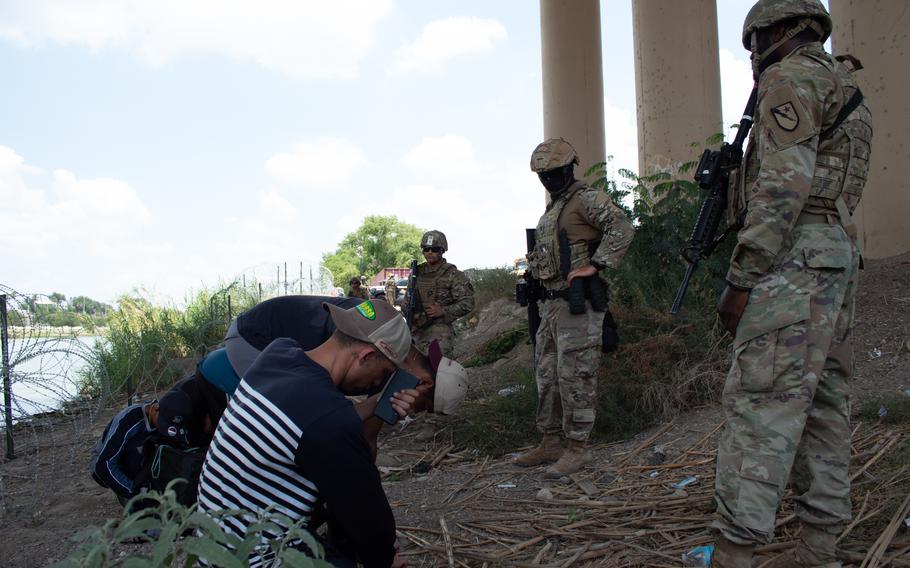
Texas National Guard troops watch over migrants who illegally crossed the Rio Grande from Mexico into Texas beneath the Camino Real International Bridge in Eagle Pass, Texas, in an undated photo. The soldiers then led the migrants to a U.S. Customs and Border Protection processing center. (Texas Military Department )
AUSTIN, Texas — Governors in Virginia, Iowa and South Carolina announced they will send National Guard units to Texas, becoming the latest Republican governors to offer troops to Gov. Greg Abbott, who put out a call for help in protecting his state’s border with Mexico.
Virginia Gov. Glenn Youngkin and Iowa Gov. Kim Reynolds said they will send about 100 National Guard members, while Gov. Henry McMaster said details about South Carolina’s Guard support will be available in the coming weeks with a deployment expected by July 1.
“The ongoing border crisis facing our nation has turned every state into a border state,” Youngkin said Wednesday in a statement.
The troops will combat the smuggling of drugs and people across the Texas border and “address the humanitarian crisis” during a deployment authorized through Sept. 30, Youngkin said. The 100 Guard members will be joined by 21 support personnel, and troops will be equipped with weapons, ammunition, body armor, protective masks, and night vision and other support devices, according to the governor’s directive.
Democratic state lawmakers in Virginia told The Washington Post that they were informed the deployment will cost about $12.4 million in state funds, or $3.1 million per month. House Minority Leader Del. Don Scott Jr. told the newspaper that he found the cost “disturbing” because the deployment lacks a specific and prescribed mission.
Iowa’s troops will deploy for 30 days in August and Reynolds will send 30 state police in September, according to her announcement.
The three states join governors from Florida and Tennessee who previously announced they would send troops to Texas through the Emergency Management Assistance Compact, which allows states to provide resources to each other during emergencies. Idaho and Nebraska have pledged law enforcement support, which Texas has also requested.
Each state providing support is doing so at its own expense, according to the compact request.
Florida Gov. Ron DeSantis authorized 800 troops who are scheduled to split the work in Texas into two 16-day rotations. Tennessee Gov. Bill Lee authorized a one-month assignment at the border for 100 troops.
Abbott on May 16 requested help in a letter to all governors, citing a projected surge in illegal activity at the border caused by the May 11 lifting of the public health policy, known as Title 42. The policy allowed federal border agents to quickly expel migrants over concern that they would spread the coronavirus.
The Texas governor’s stance has not wavered despite the Department of Homeland Security reporting illegal border crossings have dropped since Title 42 lifted. He hosted nine Republican governors in Austin on May 22 for a briefing on Texas’ border operations. Youngkin, McMaster, Reynolds and Lee were in attendance, according to Abbott’s office.
Roughly 5,500 Texas National Guard troops are deployed to Operation Lone Star, which began about two years ago in partnership with Texas state police. At its peak in late 2021, Abbott said about 10,000 Guard members were deployed by him.
This work is separate from a federal mission at the border, which has about 4,000 National Guard and active-duty troops authorized to serve across the entire southwest border in support of U.S. Customs and Border Protection agents.
Youngkin described the importance of sending troops as part of Virginia’s fight against fentanyl, a synthetic opioid that is often caught being smuggled into the U.S. from Mexico. The drug can be fatal in small doses. An average of five Virginians die each day from a fentanyl overdose, he said.